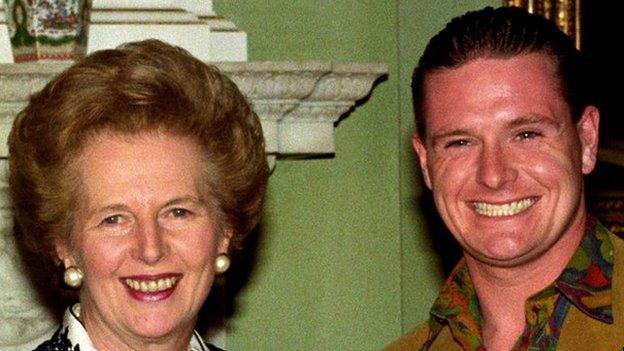National archives: When Margaret Thatcher met Gazza
- Published

Margaret Thatcher praised England's 1990 World Cup football squad for not diving when she met them after the tournament, released files show.
The then PM invited the players to No 10 after they reached the semi-finals, losing on penalties to West Germany.
And she praised them for not resorting to play-acting, saying: "Unlike other teams, our players did not immediately seek the Oscar for best actor."
The comment was revealed in a speech note released by the National Archives.
The team's visit to Downing Street came after an uplifting summer for England fans at the end of a decade repeatedly blemished by hooliganism - and an era in which Mrs Thatcher had often been critical of football and its authorities.
English clubs had been banned from playing in European competitions, following Liverpool fans' involvement in the Heysel Stadium disaster that cost 39 lives.
Mrs Thatcher had wanted to introduce an ID card system that would have meant only registered fans could attend matches, while the government had even considered withdrawing from Italia 90 amid fears it would provide a "natural focus" for violence.
The idea was dismissed and Bobby Robson's team went on to top their group, beating Belgium and Cameroon en route to the semi-final. A 23-year-old Paul Gascoigne was propelled to international stardom in the process.
'Not anti-football'
And the files released from the National Archive in Kew, West London, suggest aides saw the PR value in being associated with what turned out to be a successful tournament.
Mrs Thatcher's private secretary Dominic Morris advised allowing her speech to be filmed "since it would help promote the image that you are not anti-football (but simply anti-hooliganism)", the documents show.
The draft speaking notes show she wanted to congratulate the team for winning the Fifa Fair Play Trophy and note the players were often first to "stretch out the hand of friendship to the opposing team player".
According to the draft speech, she said: "We all noticed too that when an England player was brought down, unlike other teams, our players did not immediately seek the Oscar for best actor for impersonating the death scene from Richard III.
"You got on calmly with the game and always accepted the referee's decisions without demur."